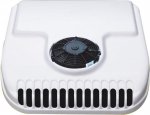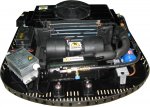mhiscox
Exp. Leader Emeritus
There are a lot of advantages to being able to air condition a camper cabin using battery power. In fact, I can do it--for just an hour or two--in my Sprinter with a small AC and over 600 amp-hours of AGM batteries. A lot of cost for a fairly modest accomplishment.
But if you'd like to have a better analysis of how batttery-powered AC could work, the equipment available, and some idea of the appropriate component sizing, you'll likely find this twelve-page writeup by the people at Dometic Truck to be useful:
http://dometictruck.com/pdf/L-2523.pdf,
With an increase in anti-idling restrictions and widespread recognition that idling a big diesel just to provide sleeper AC is expensive and hard on the engine, considerably more options have been made available. Most common to date are Auxiliary Power Units (APU's) which fit in a big box on the truck's frame and operate off a modest-sized diesel generator. They still burn diesel and still make noise, but both the noise and fuel consumption are much reduced. Dometic's newly-expanded product line has the system running off AGM batteries that have been charged the truck's oversized replacement alternator during routine operation.
Anyway, I found their document to be a pretty good summary of what you could expect to accomplish using batteries to power the AC for both trucks and camper cabins. You might, as well.
But if you'd like to have a better analysis of how batttery-powered AC could work, the equipment available, and some idea of the appropriate component sizing, you'll likely find this twelve-page writeup by the people at Dometic Truck to be useful:
http://dometictruck.com/pdf/L-2523.pdf,
With an increase in anti-idling restrictions and widespread recognition that idling a big diesel just to provide sleeper AC is expensive and hard on the engine, considerably more options have been made available. Most common to date are Auxiliary Power Units (APU's) which fit in a big box on the truck's frame and operate off a modest-sized diesel generator. They still burn diesel and still make noise, but both the noise and fuel consumption are much reduced. Dometic's newly-expanded product line has the system running off AGM batteries that have been charged the truck's oversized replacement alternator during routine operation.
Anyway, I found their document to be a pretty good summary of what you could expect to accomplish using batteries to power the AC for both trucks and camper cabins. You might, as well.



